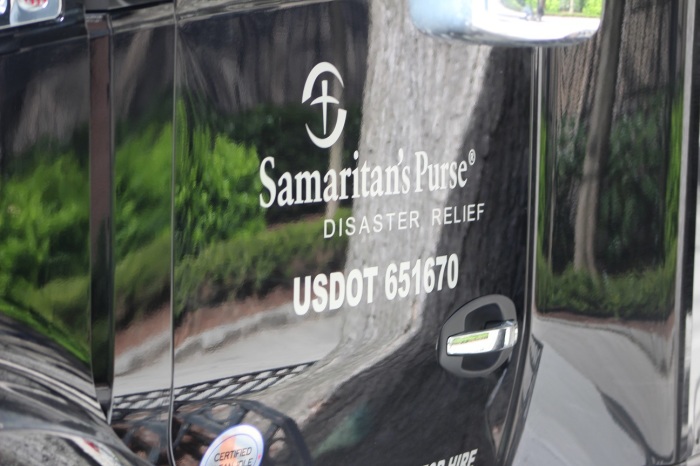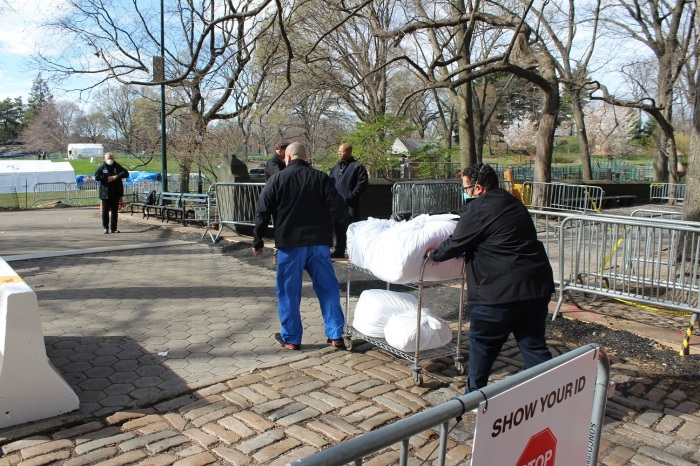Samaritan’s Purse doctor describes time at NYC field hospital: 'It was hard'

NEW YORK — As the debate over reopening the economy in the wake of the coronavirus continues to divide the nation, Dr. K. Elliott Tenpenny, a doctor who led the recently shuttered field hospital in Central Park for Samaritan's Purse, urged Christians to stand in the gap of that divide and pray.
“There are a lot of difficult decisions ahead, difficult decisions by our leaders, difficult decisions by the states when they need to reopen and people need to go back to work, go back to businesses and that has to happen eventually. … My biggest encouragement to the Christian community would be to pray for our leaders to make wise decisions,” Tenpenny told The Christian Post as the remainder of the tents for the field hospital which operated for more than a month was dismantled Monday.
“There is not one side to this argument or this desire to be done with this virus. The world has to open back up but we also have to protect the most vulnerable of our citizens and our people. As Christians, we stand in the gap and can fill that with prayer. We can pray for our leaders and pray for our leadership both locally and nationally that the right decisions are made and that people take this very seriously,” he said.
Worldwide cases of the coronavirus surged to over 4 million at the start of this week, with cases in the United States exceeding 1.3 million. Deaths from the virus totaled more than 279,700 globally, including more than 80,000 in the U.S., according to data collected by the Johns Hopkins University.

Doctors and other medical staff from the evangelical Christian humanitarian aid organization Samaritan’s Purse treated 333 coronavirus patients during their one month mission in New York City as part of the Mount Sinai Health System, and 190 of them were treated at the field hospital.
While he was unable to share raw data on the number of patients that died under their care, Tenpenny told CP that the death rate was about equal to what the Mount Sinai Health System saw in general for coronavirus patients. And a study from scientists at Sema4, a patient-centered health intelligence company, said that was 22.6%.
“It was hard, honestly. It was hard. We received a lot of patients early in their course of the disease. And that means that a lot of them got better and some of them didn’t and they got progressively worse,” Tenpenny said.
“We got to know those patients before they had gotten that bad; had spoken to them, had gotten to know them and then some of them would get progressively worse. So it wasn’t just a patient with name X, Y and Z. It was a patient you truly knew and you cared about and you knew their name and you had talked to them about their family and ... that made it even harder.”
One of the challenges for his team treating the coronavirus patients, he said, was having to deal with the way the virus devastated the ones who didn’t survive, who were mostly older adults.
“This disease is a terrible disease. It really devastates people but it does it in a way that’s very sudden. So someone can be doing well for a day or two and then all of a sudden just go downhill so fast. They can become so short of breath or as Mount Sinai discovered later they can start having things like blood clots that form that go to their lungs rapidly," he explained.
“We had cases like that that we had to treat but we got to know these patients. We knew them. We cared for them. So when they started doing poorly, it hit the staff hard.’”
During those hard times, Tenpenny said, the staff prayed and supported each other and began ringing a bell every time a patient was successfully discharged as a symbol of hope.
“We sustained ourselves through prayer. We sustained ourselves through supporting each other and sustained ourselves just through the hope of each one of those patients leaving. So that’s one of the reasons we starting having a bit of a ceremony — clapping, ringing of a bell — whenever a patient was discharged,” he said. “The patients were excited for themselves going home but one of the main reasons was encouragement to the community around us but also to our own staff that there is hope. People do get better. They are going home. They are surviving.”
And among the survivors are stories of the “miraculous.”
“We saw a lot of really miraculous things happen with patients getting better when they shouldn’t have,” Tenpenny said. “And it was really amazing to watch.”
He had high praise for the City of New York, which he said impressed him with their “grit.”
“I really think that the biggest thing that was impressed upon us by the city in general was just the welcoming nature. Speaking personally here, I saw a lot of the sort of grit and ability of the city to rally around itself and to help everyone around that happened during that event,” he said.
“I heard many people say the last time there was an event that threatened the city as much as this was 9/11. And I’m seeing the same spirit come out to help New Yorkers, to get New York back on its feet and that was the constant attitude that was shared with us,” he noted.
As Tenpenny and his team wrap up their work in New York City, he said the biggest lesson he has come to appreciate is that “everybody has needs.”
“The biggest lesson I learned is that no matter who we are anywhere in the world, everybody has needs and God allows us at times to minister to people — in Congo with Ebola and Iraq and war experiences and also right here in New York City, one of the most modern cities in the world,” he said. “None of us are over and above our need for God’s presence and His healing hand and I just count it as a privilege to have been able to be a part of a team that provided that for a very small period of time and look forward to where God leads us in the future.”




























